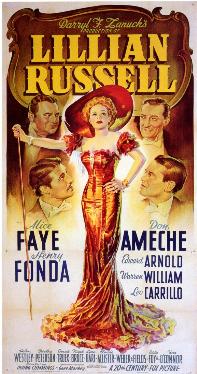Lillian Russell (film)
| Lillian Russell | |
|---|---|
 Theatrical release poster | |
| Directed by | Irving Cummings |
| Written by | William Anthony McGuire |
| Produced by | Darryl F. Zanuck |
| Starring | Alice Faye Don Ameche Henry Fonda Edward Arnold |
| Cinematography | Leon Shamroy |
| Edited by | Walter Thompson |
| Music by | David Buttolph (uncredited) Cyril J. Mockridge (uncredited) Alfred Newman (uncredited) |
Production company | 20th Century Fox |
| Distributed by | 20th Century Fox |
Release date |
|
Running time | 127 minutes |
| Country | United States |
| Language | English |
Lillian Russell is a 1940 American biographical film of the life of the singer and actress. The screenplay was by William Anthony McGuire. The film was directed by Irving Cummings and produced by Darryl F. Zanuck. It stars Alice Faye in the title role, Don Ameche, Henry Fonda and Edward Arnold as Diamond Jim Brady.
Richard Day and Joseph C. Wright were nominated for an Academy Award for Best Art Direction, Black-and-White.[1]
Plot
Helen Leonard (Faye) has a beautiful voice. As she grows up, she trains to become an opera singer. Her instructor, however, informs her that her voice is pleasing, but not suitable for grand opera. Returning home one day, she and her grandmother (Westley) are saved by a handsome young man, newspaperman Alexander Moore (Fonda). Meanwhile, Helen's mother, Cynthia (Peterson), has political aspirations, but only receives a handful of votes for mayor.
While singing one evening, Helen is overheard by vaudeville impresario Tony Pastor (Carrillo), who hires her to sing at his theater. She is given a new name, Lillian Russell, and quickly rises to fame as the toast of New York. As the years pass, Lillian becomes one of the most revered stars in America. She has many suitors, including financier Diamond Jim Brady (Arnold), Jesse Lewisohn (William), and composer Edward Solomon (Ameche). She eventually marries Edward and they move to London, where Gilbert and Sullivan are writing an operetta especially for her.
Alexander Moore returns and makes a contract with Lillian to write stories about her rise to fame. But tragedy soon strikes when Edward dies one evening while composing a song for her. Lillian cancels the interviews and makes an appearance in the show, singing the song her husband composed for her, "Blue Lovebird."
Lillian returns to America and is, by this time, the greatest stage attraction of the century. Alexander comes to see Lillian after a new show and the two are happily reunited.
The plot takes many liberties with the facts, in particular giving her only two husbands instead of four.[2]
Cast
- Alice Faye as Lillian Russell (Helen Leonard)
- Don Ameche as Edward Solomon
- Henry Fonda as Alexander Moore
- Edward Arnold as Diamond Jim Brady
- Warren William as Jesse Lewisohn (The Famous J.L.)
- Leo Carrillo as Tony Pastor
- Helen Westley as Grandma Leonard
- Dorothy Peterson as Cynthia Leonard
- Ernest Truex as Charles Leonard
- Nigel Bruce as William S. Gilbert
- Claud Allister as Arthur Sullivan
- Joe Weber as Himself
- Lew Fields as Himself
- Eddie Foy Jr. as Eddie Foy
- Una O'Connor as Marie
- Joseph Cawthorn as Leopold Damrosch
- Robert Emmett Keane as Jeweler
- Harry Hayden as Mr. Sloane
- William Davidson as President Cleveland
- Charles Halton as Dr. Dobbins
- Irving Bacon as Soldier
- Robert Homans as Stage Doorman
- Cecil Cunningham as Mrs. Hobbs
- Tom London as Frank (uncredited)
Songs
Many pre-1900s songs were used for the film, including "Ma Blushin' Rosie", "Come Down Ma Evenin' Star", and "After the Ball". Several new songs were also written for the film, including "Adored One" and most notably, "Blue Lovebird", composed by Gus Kahn and Bronisław Kaper.
See also
- Diamond Jim, a 1935 film starring Edward Arnold, again as Jim Brady
References
- ^ "NY Times: Lillian Russell". NY Times. Retrieved 2008-12-13.
- ^ Green, Stanley (1999) Hollywood Musicals Year by Year (2nd ed.), pub. Hal Leonard Corporation ISBN 0-634-00765-3 page 96
External links
- Lillian Russell at the TCM Movie Database
- Lillian Russell at IMDb
- 1940 films
- 1940s biographical drama films
- 1940s musical drama films
- 1940s historical films
- 20th Century Fox films
- American films
- American biographical drama films
- American historical films
- American musical drama films
- Biographical films about singers
- American black-and-white films
- English-language films
- Films directed by Irving Cummings
- Films set in the 1870s
- Films set in the 1880s
- Films set in the 1890s
- Films set in the 1900s
- Films set in London
- Cultural depictions of Grover Cleveland
- Works about Gilbert and Sullivan
- 1940 drama films
